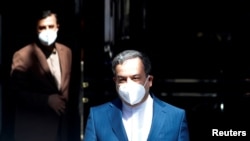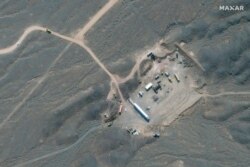With the U.S. and Iran planning their second round of indirect nuclear talks in Vienna this week, some analysts say Sunday’s sabotage of Iran’s Natanz nuclear site has weakened the Iranian position, while others contend it all depends on Iran’s response.
White House Press Secretary Jen Psaki said Monday that the U.S. expects the indirect talks to proceed in the Austrian capital on Wednesday as scheduled. The two sides held their first round of indirect talks in Vienna from April 6 to 9, with representatives of Britain, France, Germany, China and Russia acting as mediators.
Through the indirect talks, the U.S. and Iran are trying to bring each other back into compliance with a 2015 nuclear deal in which Iran agreed to curb nuclear activities that can be weaponized in return for the U.S. and the other world powers providing sanctions relief. Washington pulled out of the deal and began unilaterally tightening sanctions on Iran in 2018 under then-President Donald Trump, and Tehran retaliated a year later by starting to exceed the nuclear limits of the deal known as the Joint Comprehensive Plan of Action (JCPOA).
“The diplomatic discussions that have been taking place ... we expect them to be difficult and long,” Psaki said. “We have not been given any indication about a change in participation for these discussions.”
Iran has not publicly stated any changes to its plans to participate in the second round of Vienna talks since Sunday’s incident at the Natanz Fuel Enrichment Plant. Iranian Foreign Minister Mohammad Javad Zarif accused Tehran’s top regional rival Israel of sabotaging the nuclear plant’s electricity distribution network, causing a blackout and disrupting operations. He also labeled the incident an act of “nuclear terrorism.”
Israel has neither confirmed nor denied responsibility for the incident. Israeli officials long have said they are prepared to act militarily to prevent Iran from developing nuclear weapons under the cover of what Tehran calls a civilian energy program. Israel also has vowed to defend itself from Iranian proxy militias near its borders, but officials typically have refrained from confirming involvement in actions against Iran.
Behrooz Bayat, a Vienna-based Iranian former International Atomic Energy Agency (IAEA) consultant, said he believed an explosion had cut off the power to Natanz’s first-generation centrifuges that enrich uranium, a key ingredient in making nuclear bombs.
“Since the first-generation centrifuges are very sensitive and precise devices, it is likely that the sudden power outage damaged 5,000 of them and made them unusable,” Bayat said in an interview with VOA Persian on Monday. “This does not mean that they cannot be repaired, but it will take months, and Iran’s enrichment program will be postponed.”
Iran’s increasing violations of JCPOA uranium enrichment limits in recent months have been aimed at pressuring the Biden administration to lift Trump’s sanctions and return to the deal, Bayat said. U.S. officials have said Iran appears to be several months away from having enough enriched uranium to make a nuclear bomb.
“But the message of this attack [on Natanz] is that Iranian Supreme Leader Ayatollah Ali Khamenei cannot proceed on this route and will be unsuccessful,” Bayat said.
In a Sunday tweet, Israeli network Channel 13 defense correspondent Alon Ben-David said: “Without the ability to enrich at Natanz in the coming months, Iran is losing its means of pressure in negotiations. Through security and intelligence channels, American officials expressed satisfaction with the damage to the facility.”
Iranian officials have threatened to take revenge against Israel for the Natanz incident.
Israeli analyst Sima Shine of Israel’s Institute for National Security Studies (INSS) told VOA that Iran has several options for a retaliatory strike.
“They tried in the past and I am sure they will try again in the cyber field, if they have any capability, [to conduct] a dramatic one to penetrate into Israeli civilian infrastructure,” Shine said. “They tried in the water field and others, and they will try to do it in the future, if it will be possible for them and successful.”
In separate comments to VOA, INSS analyst Eldad Shavit said rising tension between Iran and Israel may push the Biden administration to try to reach a JCPOA deal with Iran before tension escalates further.
“There is reason to believe that the U.S. administration will be now even more under pressure to reach an agreement with the Iranians because it is their strategic objective to return to the JCPOA and because they don’t have an alternative policy vis-a-vis Iran,” Shavit said.
In addition to Iran’s threatened retaliation, Zarif said Tehran is planning a “significant upward leap” in its violations of the JCPOA curbs on its nuclear activities.
Foundation for Defense of Democracies analyst Behnam Ben Taleblu told VOA Persian that Iran is likely to maintain its strategy of continued nuclear escalation to try to pressure the U.S. into weakening sanctions.
“I think that whatever kind of shadow war is going on in the region will be irrelevant to the JCPOA talks, much like it was in the pre-JCPOA era in the early 2010s,” Taleblu said.
This article originated in VOA’s Persian Service. Linda Gradstein contributed from Jerusalem and VOA Persian’s Payam Yazdian and Katherine Ahn contributed from Washington.






